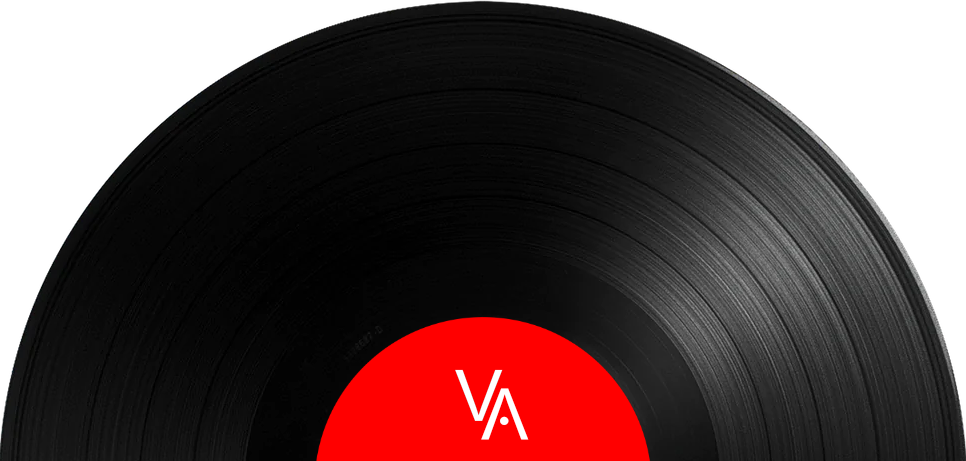
Like 'em or hate 'em, everybody knows Kiss. Formed in 1973, the band blasted out of seemingly nowhere, dressed kabuki-style and breathing fire and spitting blood and singing testosterone-fuelled songs about girls and sex and more girls and more sex. And also some songs about girls and sex.
The band has often been called an influence by other bands that came along in their wake in the ensuing years, and that's the idea behind this recording, which - of course - was Kiss' idea. The call went out and the artists showcased here responded by kissing the ass of the band that influenced them by reworking some of the better known songs.
At the time of this LP's release, in 1994, Kiss discovered they did not own the rights that would allow them to use Ace Frehley's "spaceman" makeup likeness on the cover. As a result it does not appear and is replaced by something Paul Stanley wore briefly early on in the band's career that is now referred to as the "bandit" design. The artwork, which features a flag in the background, has several variations where the flag corresponds to the country the LP was released in. Pictured here are the Canadian, Australian, Japanese and American variations that are in my collection. The Canadian version has two variations: censored and uncensored. I traded in the uncensored one (pictured here).
I don't know why I have four copies of this thing (one LP and three CDs). But I have all the flags so I must have got into collecting the different covers for some dumb reason, which was more-than-likely what Gene Simmons was counting on as a way to make four times as much money. The Australian version is a gold CD, which does nothing to make it sound any better than the regular CD.
It's a pretty interesting record despite its simplemindedness. Opening with Lenny Kravitz's take on Deuce, a song from Kiss' first LP that is actually a really good song, it then slips into a duet of Hard Luck Woman featuring Kiss and award-winning country singer Garth Brooks on lead vocals, who admits to being a fan. And it's a bit different, to say the least.
Other ass kissers here are lesser known or were up-and-comers in the early 90s, but for the most part have since disappeared or moved on to bigger and better things. Shandi's Addiction (which featured Maynard James Keenan of Tool, Tom Morello and Brad Wilk of Rage Against the Machine and Audioslave, and Billy Gould of Faith No More), perform an unremarkable take of Christine Sixteen, Gene Simmons' bizarre ode to pedo lust that somehow became a hit on AM radio. The Lemonheads, Yoshiki and the American Orchestra, Toad The Wet Sprocket and Die Arzte - not exactly household names - also make appearances playing Plaster Caster, Black Diamond, Rock & Roll All Nite and Unholy respectively. Black Diamond is performed as a classical piece, which seems ludicrously out of place here but more-than-likely stoked Kiss' egos by suggesting their music could transcend genres. And that might be a neat idea, but it is such an unremarkable performance as to be puzzling. It's not that the musicianship is poor; there's just only so much you can do with the song itself beyond the original intention. But I digress. I am getting far too analytical for something that is way too thin to warrant this much depth.
Toad The Wet Sprocket's Rock & Roll All Nite is a sleeper. No, really. It's slowed down so much they should probably be singing "I just wanna sleep all night … " It's not very good, truth be told.
Dinosaur Jr. does what they can with Goin' Blind, a song from the second Kiss album, Hotter Than Hell, that was never a great song to begin with and was also penned by Gene Simmons and also contains mention of a 16-year-old love interest, which is a bit disturbing but was probably meant to be.
Some tracks really are interesting and fun to listen to, such as Extreme's remake of Strutter and - my favourite - The Mighty Mighty Bosstones's wonderfully gritty Detroit Rock City, which bizarrely (but also fittingly) features horns. I think I like it better than the original. These interpretations work because they don't stray too far from home. And Anthrax does a good job with She, another decent song, which makes me wish better choices had been made regarding the actual song selection. Where is Room Service. Hotter Than Hell, Do You Love Me?, Watchin' You, C'mon And Love Me or 2,000 Man? That would have been a better record.
The album was released to mixed reviews. It's not great but it's fun and I play it, or part of it, once every few years or so if I feel like letting 16-year-old me out of the box for a bit.
I don't think this record appealed to Kiss fans (other than the die-hards) as much as it did to fans of the ass-kissing contributors. But so what? It is what it is. Like it or hate it. Take your pick.
And if you don't like it - kiss my ass.
Like 'em or hate 'em, everybody knows Kiss. Formed in 1973, the band blasted out of seemingly nowhere, dressed kabuki-style and breathing fire and spitting blood and singing testosterone-fuelled songs about girls and sex and more girls and more sex. And also some songs about girls and sex.
The band has often been called an influence by other bands that came along in their wake in the ensuing years, and that's the idea behind this recording, which - of course - was Kiss' idea. The call went out and the artists showcased here responded by kissing the ass of the band that influenced them by reworking some of the better known songs.
At the time of this LP's release, in 1994, Kiss discovered they did not own the rights that would allow them to use Ace Frehley's "spaceman" makeup likeness on the cover. As a result it does not appear and is replaced by something Paul Stanley wore briefly early on in the band's career that is now referred to as the "bandit" design. The artwork, which features a flag in the background, has several variations where the flag corresponds to the country the LP was released in. Pictured here are the Canadian, Australian, Japanese and American variations that are in my collection. The Canadian version has two variations: censored and uncensored. I traded in the uncensored one (pictured here).
I don't know why I have four copies of this thing (one LP and three CDs). But I have all the flags so I must have got into collecting the different covers for some dumb reason, which was more-than-likely what Gene Simmons was counting on as a way to make four times as much money. The Australian version is a gold CD, which does nothing to make it sound any better than the regular CD.
It's a pretty interesting record despite its simplemindedness. Opening with Lenny Kravitz's take on Deuce, a song from Kiss' first LP that is actually a really good song, it then slips into a duet of Hard Luck Woman featuring Kiss and award-winning country singer Garth Brooks on lead vocals, who admits to being a fan. And it's a bit different, to say the least.
Other ass kissers here are lesser known or were up-and-comers in the early 90s, but for the most part have since disappeared or moved on to bigger and better things. Shandi's Addiction (which featured Maynard James Keenan of Tool, Tom Morello and Brad Wilk of Rage Against the Machine and Audioslave, and Billy Gould of Faith No More), perform an unremarkable take of Christine Sixteen, Gene Simmons' bizarre ode to pedo lust that somehow became a hit on AM radio. The Lemonheads, Yoshiki and the American Orchestra, Toad The Wet Sprocket and Die Arzte - not exactly household names - also make appearances playing Plaster Caster, Black Diamond, Rock & Roll All Nite and Unholy respectively. Black Diamond is performed as a classical piece, which seems ludicrously out of place here but more-than-likely stoked Kiss' egos by suggesting their music could transcend genres. And that might be a neat idea, but it is such an unremarkable performance as to be puzzling. It's not that the musicianship is poor; there's just only so much you can do with the song itself beyond the original intention. But I digress. I am getting far too analytical for something that is way too thin to warrant this much depth.
Toad The Wet Sprocket's Rock & Roll All Nite is a sleeper. No, really. It's slowed down so much they should probably be singing "I just wanna sleep all night … " It's not very good, truth be told.
Dinosaur Jr. does what they can with Goin' Blind, a song from the second Kiss album, Hotter Than Hell, that was never a great song to begin with and was also penned by Gene Simmons and also contains mention of a 16-year-old love interest, which is a bit disturbing but was probably meant to be.
Some tracks really are interesting and fun to listen to, such as Extreme's remake of Strutter and - my favourite - The Mighty Mighty Bosstones's wonderfully gritty Detroit Rock City, which bizarrely (but also fittingly) features horns. I think I like it better than the original. These interpretations work because they don't stray too far from home. And Anthrax does a good job with She, another decent song, which makes me wish better choices had been made regarding the actual song selection. Where is Room Service. Hotter Than Hell, Do You Love Me?, Watchin' You, C'mon And Love Me or 2,000 Man? That would have been a better record.
The album was released to mixed reviews. It's not great but it's fun and I play it, or part of it, once every few years or so if I feel like letting 16-year-old me out of the box for a bit.
I don't think this record appealed to Kiss fans (other than the die-hards) as much as it did to fans of the ass-kissing contributors. But so what? It is what it is. Like it or hate it. Take your pick.
And if you don't like it - kiss my ass.


